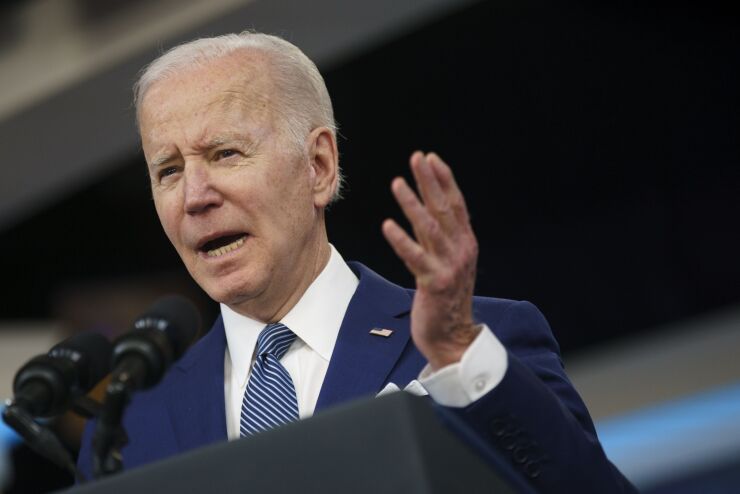
WASHINGTON — The Biden administration has proposed more funding for government agencies tasked with combating illicit finance, Small Business Administration programs that back private-sector lending, affordable housing financed by community development financial institutions, as well as efforts to combat climate change and the risk it poses to the financial system.
The White House’s overall $5.8 trillion budget proposal for fiscal year 2023, published Monday, reflects
In a statement, Treasury Secretary Janet Yellen said the U.S.’s “rapid” economic recovery from the COVID-19 pandemic over the previous year “allows us to look beyond the pandemic-induced crisis and provide a road map to address future challenges: creating a tax system that is fair to working families, expanding access to capital in disadvantaged communities, and safeguarding the financial system.”
As the U.S. continues to expand
Fincen is in need of more funding to adequately enforce new anti-money-laundering laws enacted last year, former acting Director Michael Mosier told the Senate Banking Committee earlier this month. Fincen and the Treasury's Office of Foreign Assets Control also need the additional resources to keep pace with the rapidly evolving uses of cryptocurrencies for illegal activity.
The monies primarily would be spent on additional personnel and technology, according to Mosier, who is now a senior advisor to the Oliver Wyman consulting firm's anti-financial-crime and digital-assets practices.
"Resource them for their current job before burdening them and industry with more unfunded mandates," Mosier urged committee members at a March 17 hearing on digital assets and illicit finance.
On Monday, the White House additionally requested $293 million to “rebuild institutional capacity and strengthen the role of Treasury’s policy offices,” according to the department’s commentary on the budget. The Trump administration slashed budgets and, by extension, the policymaking abilities of some parts of Treasury, notably the Office of Financial Research that’s meant to warn policymakers of emerging threats to the financial system.
The budget plan also includes $215 million to guard against cyberattacks aimed at the Treasury's own data and systems.
For the Small Business Administration, the fiscal 2023 budget authorizes lending and investments totaling $71.5 billion — a 15% increase from fiscal 2022. The biggest increase, $5 billion, is allocated to the agency's flagship 7(a) loan guarantee program, which would be authorized to guarantee $35 billion of loans. The budget also would boost 504, the SBA's second-largest program, providing $9 billion for regular 504 loans, up from $7.5 billion in fiscal 2022, and $7.5 billion for the commercial real estate refinance program.
Moreover, the budget would expand SBA's secondary market guarantee program, supporting sales totaling $15 billion, up from $13 billion in the 2022 fiscal year.
Elsewhere, the budget proposes $5 billion in long-term mandatory funding for community development financial institutions, institutions that primarily operate in low-income areas, to create new affordable housing. That will include both rental and for-sale units.
In addition, the budget would provide $331 million for the Treasury Department’s CDFI Fund — a 23% increase from the current fiscal year.
The budget also includes a chunk of funding to help meet the Biden administration’s climate finance goals, with a $1.6 billion contribution to the Green Climate Fund and a $3.2 billion loan to the Clean Technology Fund. The two entities are multilateral funds that seek to help developing nations transition to cleaner energy and foster international cooperation on climate change.
In total, the budget includes more than $11 billion in international climate finance funding.
There would be additional funds for the Treasury's “climate hub,” an initiative led by John Morton, a former Obama administration advisor, that’s focused on steering the regulatory agenda toward climate risks to the financial system.
John Reosti and Kyle Campbell contributed to this article.





